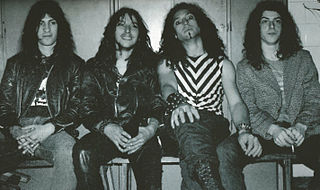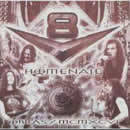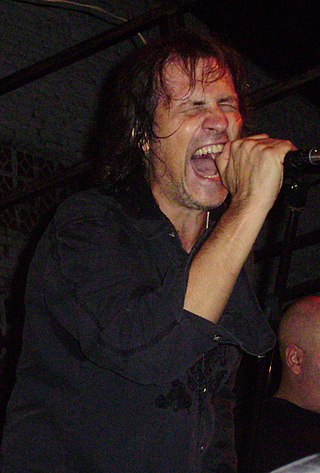
Brujeria is an American extreme metal band formed in Los Angeles, California in 1989. The band has Spanish lyrics with topics such as Satanism, anti-Christianity, sex, immigration, narcotics smuggling, and politics. Brujeria portrays Mexican imagery, with several members being Hispanic and Latino Americans, while the band's name stands for brujería.
Argentine rock is rock music composed or performed by Argentine bands or artists mostly in Spanish.

Rata Blanca is an Argentine heavy metal band, formed in 1986.

El Peyote Asesino is a Uruguayan rock band formed in 1994 in the Villa Española neighborhood (Montevideo). It is made up of Fernando Santullo —credited as "L. Mental"— and Carlos Casacuberta on vocals, Daniel Benia on bass, Juan Campodónico on guitar, Bruno Tortorella on keyboards, Matías Rada on guitar and Pepe Canedo on drums. His style combines heavy metal, funk, and rap, something that was atypical in the Uruguayan rock scene at that time.

La Renga is an Argentine hard rock band, formed in 1988.
Hermética was an Argentine thrash metal band from San Martín, Buenos Aires. It was formed by bassist Ricardo Iorio in 1987 after his previous band, V8, disbanded. Hermética was signed to the independent record label Radio Trípoli Discos throughout their career. The band's initial lineup consisted of Iorio, vocalist Claudio O'Connor, drummer Fabián Spataro and guitarist Antonio Romano. Spataro left the band in 1988 and was replaced by Antonio Scotto. This lineup recorded their eponymous album, the first thrash metal album recorded in Argentina. At this point of their career, Hermética performed mainly in Argentina, except for one concert held in Uruguay. In 1990, they released Intérpretes—an extended play which included covers of Argentine rock and tango songs. Both albums were released by Radio Trípoli Discos as a single CD when digital technology became available.

V8 was an Argentine heavy metal band formed in 1979, one of the first notable Argentine and Latin America bands of that genre. After its dissolution former members have continued their careers starting other heavy metal bands, Hermética, Horcas, Rata Blanca, Logos and Almafuerte.

Ricardo Horacio Iorio was an Argentine heavy metal singer and bassist.

Nepal was an Argentine thrash metal band from Buenos Aires, originally assembled in 1984. The name is derived from the Asian country of Nepal.

Homenaje is a 1996 live album, recorded during the "Metal Rock Festival" at Obras Sanitarias. The concert was a reunion of the first line-up of the Argentine heavy metal band V8, with the exception of its original bass player Ricardo Iorio.

Héctor Walter Giardino is an Argentine guitarist and the leader of the heavy metal and hard rock band Rata Blanca.

Hermética is the debut album by Argentine thrash metal band Hermética, released in 1989.

Gustavo Nestor Rowek is an Argentine heavy metal drummer known for being one of the founders of heavy metal movement in Argentina through its participation in Surmenage, WC, V8 and Rata Blanca. Currently he works in his own project Rowek.

Alberto Zamarbide is an Argentine heavy metal singer known for his work with bands like V8 and Logos.
Tren Loco is an Argentine heavy metal band formed in the suburban town of Grand Bourg, in Buenos Aires Province. Their lyrics relate social issues, like "Clase trabajadora", "Fuera de la Ley" (Outlaw) and "Lucila"; others are about political issues, such as "Pampa del Infierno" and "Nos vemos en Cutral-Co". They also write about personal matters: "Endemoniado" (Possessed), "No me importa" and "A ultranza". The group's name is inspired by the classic Ozzy Osbourne song: Crazy Train.

Cirse is an Argentine pop punk band from Adrogué, Buenos Aires. Before disbanding, the group consisted of vocalist Luciana Segovia, guitarists Gabriel Leopardi and Christian Bonelli, bassist Sebastián "Ziva" Leopardi and drummer Martin "Tato" Magliano.

Osvaldo Daniel Civile was an Argentine heavy metal guitarist. He was the guitarist for the bands V8 and Horcas.
The Argentine heavy metal is a heavy metal music movement that originated in Argentina in the 1980s. The first popular artist was Pappo, who created the band Riff influenced by the contemporary new wave of British heavy metal. V8 was formed at that time as well, and most of its members created notable bands after their respective departures from the band: Ricardo Iorio and Walter Giardino, currently in Almafuerte and Rata Blanca, are still popular. The second half of the 1980s saw the success of hard rock bands such as Kamikaze, Alakran and Rata Blanca, with an aesthetic similar to the contemporary glam metal. Thrash metal bands, such as Hermética, Horcas and Lethal, appeared in the late 80s and early 90s.

Taura is an Argentinian rock band founded in 2000. Its members are Santiago García Ferro, Gabriel "Chaimon" Raimondo, Leonardo Della Bitta and Alejo García Guraieb.

Walter Meza is an Argentinian singer of thrash metal and heavy metal, known for being the singer of the band Horcas, from 1997 to the present.

















